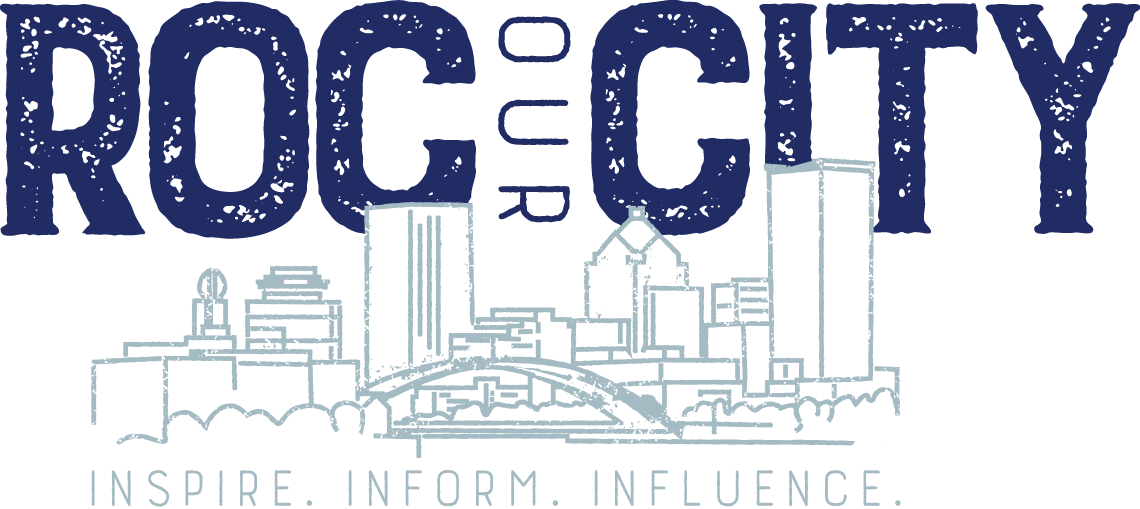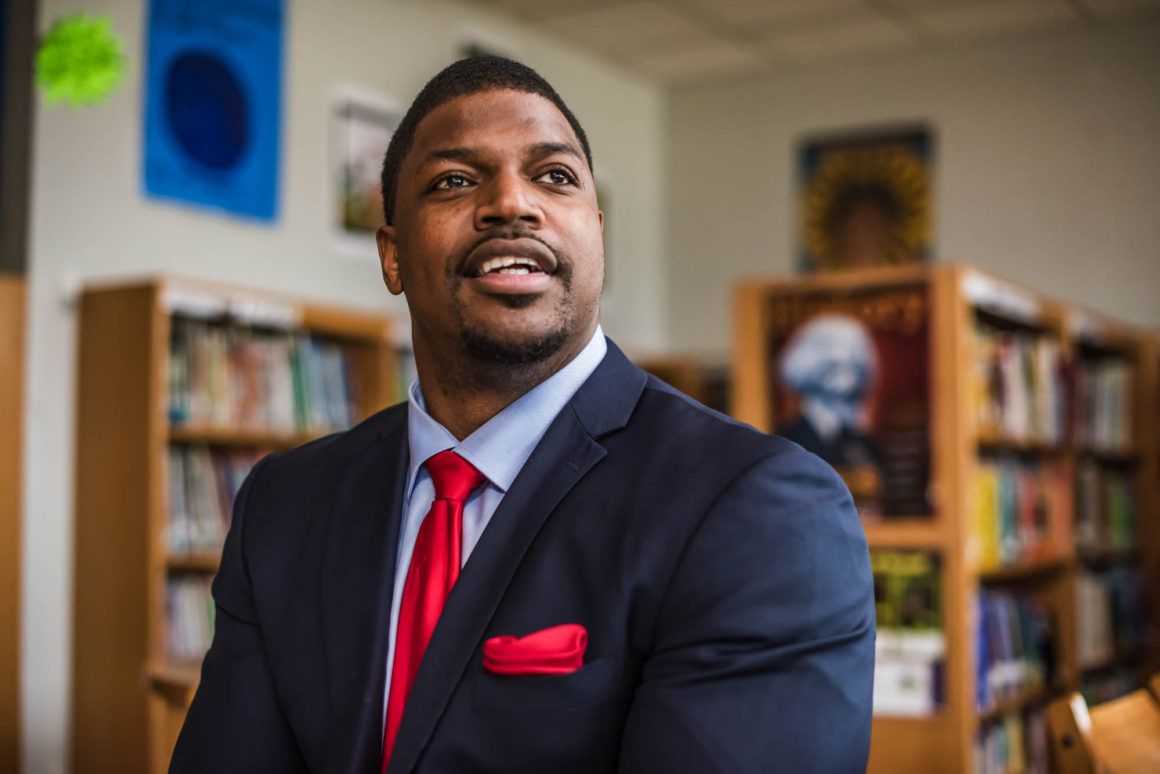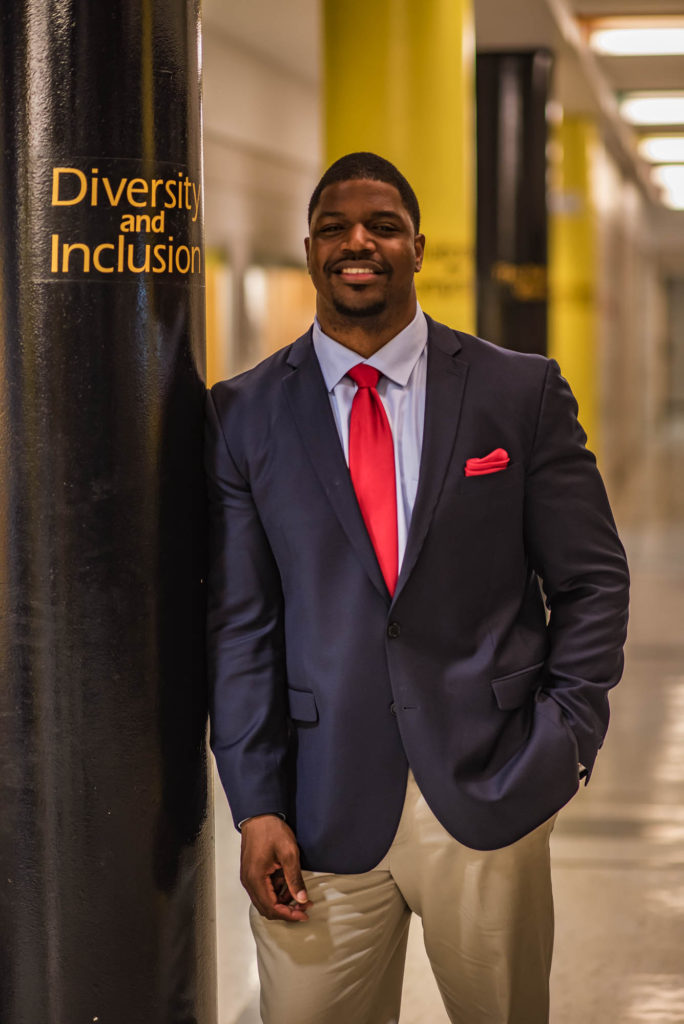
Name: Adrian Hale
Profession: Economic & Workforce Development
Title: Senior Manager, Workforce / Economic Development & Education Initiatives at Greater Rochester Chamber of Commerce
Location: Roberto Clemente School No. 8
Interviewer: John Loury Photographer: Rich Brainerd
What life events have had the greatest impact on who you are today?
I would say there have been so many life experiences that have had a major impact on me. The most significant one is a memory I have of when I was an adolescent and my mother and I were walking to the store. We lived on First Street at the time and we were walking up Bay. Her and my father had just bought me and my siblings some encyclopedias and I was being a typical obnoxious kid asking my mother when I would need them. Going grade by grade until I got to the 13th grade. She then told me that’s when I would need them, when I got to college. I asked her what college was and she said a place you go to become anything you want. I asked her, like an astronaut? And she said like an astronaut and then I asked her even the president and she said even the president. She told me I could be whatever I wanted to be if I was willing to work hard. I took that message to heart that day and never felt there wasn’t anything I couldn’t do or become.
How do you define success? And what metrics do you use to confirm it?
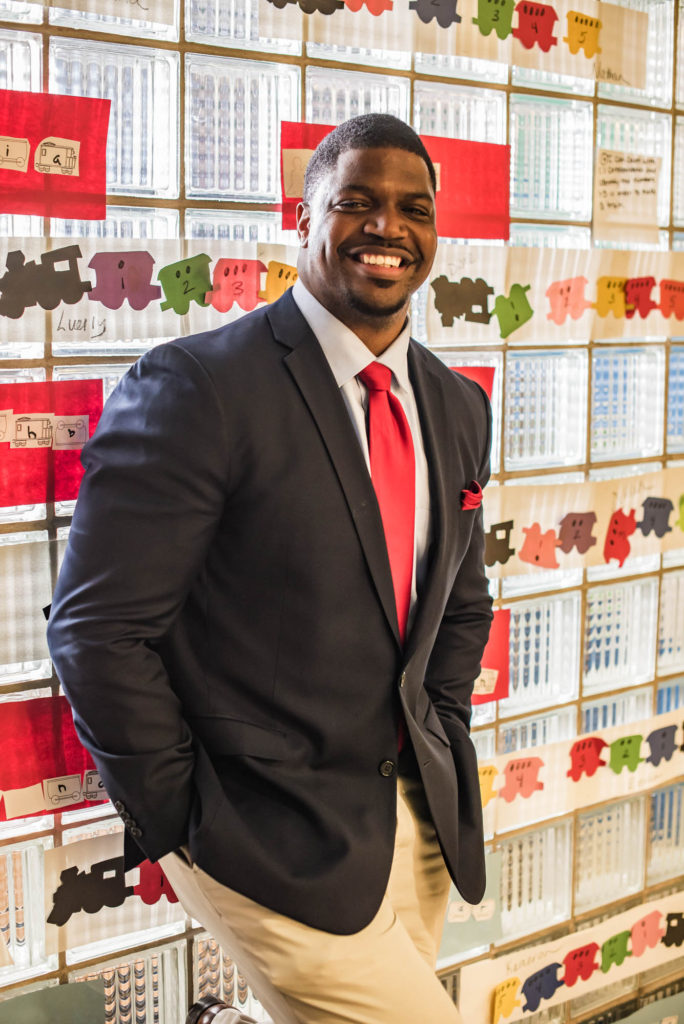
I believe in purpose first and foremost. Success to me is defined by the accomplishment of that purpose. I can’t give you a myriad of metrics that I use to measure that sentiment by, but I do have a rule that I use. In anything I do I always assess if it positively impacts others, and if it’s an action of self-interest or public interest. My parents taught me that when you overcome and accomplish great feats, what makes them great is the path behind you they leave for others to follow.
Where do you draw inspiration from?
There are people in my immediate life who inspire me and they know who they are. Then there is are the catalysts of change throughout history who motivate me, like Harold Washington, Abraham Lincoln, Huey P. Newton, William Henry Seward, Martin Luther King Jr., Bernie Sanders, and Barack Obama just to name a few.
What is it about your approach that is unique or separates you from others?
What separates me from other leaders is my conviction, and the courage I have that derives from that conviction. Which has also made me much more comfortable with risk in a way that’s empowering. I am persuaded by the vision I have of a better city, with the best schools in the nation that offer the children who need it the most a world class education, and a country that lives by the principles it espouses to believe in. I am so committed to the effectuation of this vision that I have sacrificed many opportunities and options to pursue making it a reality.
How do you use information (data) to make decisions related to your profession or craft?
Data is the technological unction to function. It informs everything I do and even helps me formulate thoughts and ideas.
What does being Rochesterian mean to you?
So first off, I love that question, and second of all, thank you so much for being here, and for inviting me, and for coming out to my elementary school, Roberto Clemente School No. 8. I appreciate that.
Being a Rochesterian to me is super important, I’m actually a second generation Rochesterian. My parents would be the first. They were both born here. My grandparents migrated up here from the South. My father’s family from Georgia. My mother’s family from Sarasota, Florida.
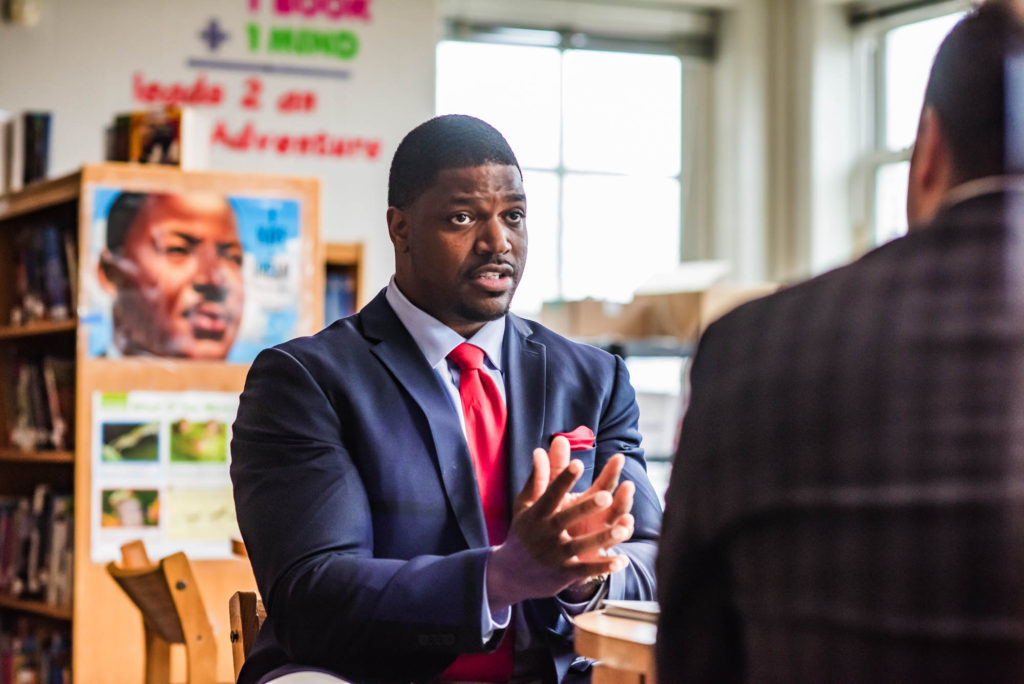
But, I’ll tell you that I think being a Rochesterian is a confluence of things. Number one is responsibility because of our legacy, right? The history of this city has had such a lasting impact on the narrative and the story of this country. So, to me being a Rochesterian is being responsible to the values, the lineage, and the timeline of progress in America, and being a catalyst to stimulate change, which is why I decided to come home after college.
In addition to that, is being a Northerner, is having four seasons. I’d also say it’s family because I think we have a city that is really favorable and accommodating to a family. A lot of people say Rochester’s a great place to raise one. I hope to be one of those people soon enough. So, I think being a Rochesterian is a lot of things.
What do you see are the greatest challenges Rochester faces in terms of future growth and success?
This is a loaded question and thank you for asking it. So, the reason we’re in a school is because I will say that I believe that ground zero for so many different challenges that we confront as a city and as a region, are predicated on the shortcomings, the ill functioning of our Rochester City School District. Its inoperative condition has implications on so many areas, and I can’t say it enough.
If you look at the school district here, I mean a lot of people move out of the city. They vacate the city because the district is not suitable to educate their kids. So, if you think about resident recruitment, resident retention is directly related to the quality of our public school system. In addition to that, you have a contracting tax base in the city. So, with structural deficits, with budgetary deficits, that takes the city to take measures like putting taxes and regulations on business, putting costs on businesses in the city that they don’t share in the suburbs.
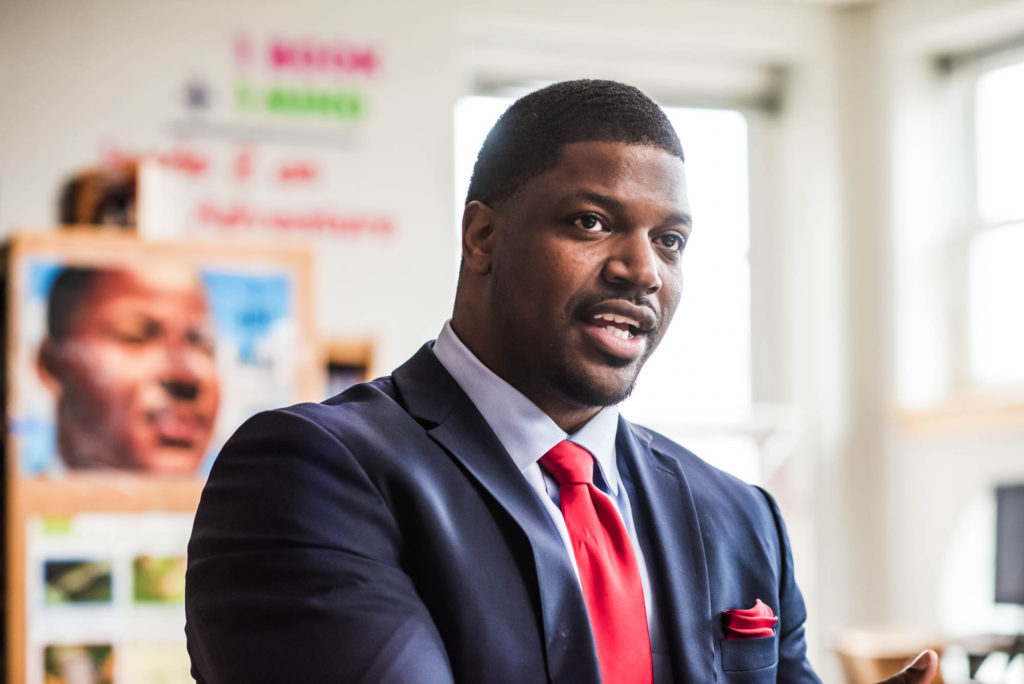
You have other revenue raising measures, ticketing, fines, and fees to try to close those structural deficits in the city’s budget, because we don’t get a lot of funding from New York State. Between Buffalo and Rochester, there’s a huge difference in how much money we receive in dollars.
Municipal esteem is also important, but I will say this to you, government doesn’t create economic development. Don’t ever fool yourself. What government can do is try to incentivize participation from the private sector to invest and to take risk.
So, on the issue of education, because its impact goes far beyond classrooms and school buildings, the issue of education is everybody’s business. I think it should be spearheaded by principal leadership, and I don’t think we see that right now. So, we talk about the greatest challenges in economic development, I think ground zero is the city school district.
I also think ground zero is structural racism in the city school district, a little bit on talent acquisition and attraction. When you look at the poverty rate, when you see how many people of color are underemployed or unemployed compared to their white counterparts in Rochester, most of which… Most of those black and brown people are educated in the city school district, who we know are not providing an equal education to black and brown people. There’s a correlation in the wherewithal, the agency, when it comes to literacy, numeracy, current college readiness in people of color in our community versus white counterparts. So, structural racism, also, ground zero is here. Okay? Because people’s success in school impacts their success in work, impacting their quality of life.
I would say number two is the lack of cooperation, the lack of collaboration, because we have in many ways economized many of the challenges that we face. If you look at the not-for-profit sector, and it’s… I don’t want to say workforce. I’m trying to get away from workforce because it sounds so commodifying, and we forget that there are people. So, we look at the talent corps of folks who make up the not-for-profit human service sector. The jobs attached to it. A lot of people, I think, become invested in the existence of these challenges. So, I think that has an impact on the attitudinal climate of our city. So, I think the reason a lot of times we don’t aspire for higher, or believe we can actually accomplish the alleviation of these problems is because we’re not being encouraged to. Often times I say direct service or emergency services are giving folks just enough to not demand a solution. So, we settle for temporary services, temporary Band-Aids on issues and problems that have no long term impact.
So, I think that’s a social psychology. So, I would say that is number two. What we think, what we believe, our faith level, pretty much… I guess you can say the regional esteem, if you will. In addition to that, I would say, the silos, right? Everybody wants their cut. Everybody wants their piece. Everybody has their turf. We are not a cooperative community. I would even settle for a little bit of competition, a little bit of cooperation. I like to say, “coopertition.” I would even settle for “coopertition.” We don’t even do that well. We have a very much adversarial civic community, where it’s me versus you. I can do a better job than you. Clearly if I can do a better job than you, the results would be self-evident, but they’re not.
I would argue we don’t need new programs at all either. I would argue that we need the rethinking, the repurposing, and the retooling of systems, law enforcement, criminal justice, human service, social service, the courts. Regardless of whatever program you create, if the systems themselves are manufacturing the problems… One more time, if the systems themselves are manufacturing the problems, the programs don’t really matter. You know what I mean? I don’t like to say root cause, because roots are organic. They exist in nature. None of this stuff is natural. It’s all man made, right? It’s all manufactured. Symptoms not systems. So, the programs, again, they address symptoms. I like to say, “Programs help people; systems can transform populations.”
If someone were to film a movie about your life, what actor or actress would you cast to play yourself?
Oh wow. I think… I was so impressed with Michael B. Jordan‘s portrayal of Killmonger in Black Panther. He had a lot of passion about a lot of similar issues and topics. So, I appreciated that. But you know, a lot of people tell me I look like Mase the rapper. So, I could see casting Mase if it’s about lookalikes too, a younger Mase. A younger lot younger Mase.
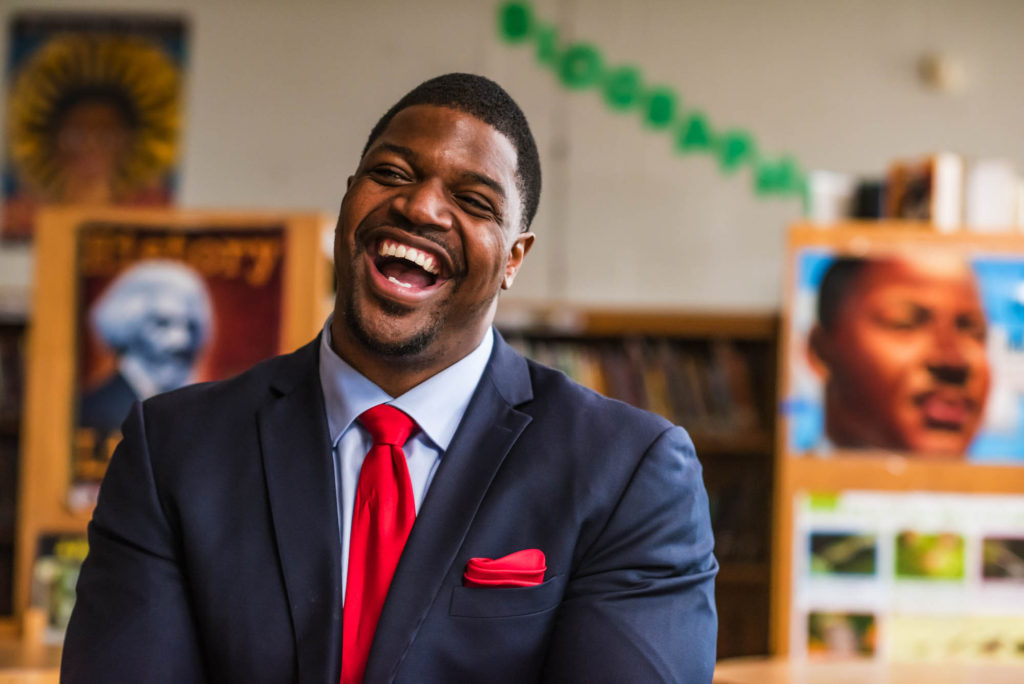
The Black Panther movie had the whole black community inspired and energized. I have to tell you though, I empathized a lot with Killmonger’s character because we were both veterans. We both grew up in inner city black America. We both had a passion to see, or to perceive uplift and progress as only effective as it’s able to reach the people at the absolute bottom. So, to me, the touchstone for efficacy is at the ground, right? It’s not enough to touch people who look like me, who have all the credentials, who have all of the accolades, and the abilities. But it’s about remediating, intervening on behalf of those who have literally been left out. And as a result, their wherewithal, their agency as individuals is stunted. It’s underdeveloped. That’s where the remediation and rehabilitation piece is key.
So, I think I share a world view with Killmonger. I also think the movie did an awful job of assassinating his intention, and making him seem combative and adversarial. They made him a villain. But I think if you look at the timeline of black American progress. I’m sitting in between two examples of that, right? Whether it was Frederick Douglass’ speeches like, “What is the Fourth of July to the Negro,” or Dr. King’s, “When Silence Becomes Betrayal,” or many speeches by Malcolm X, or many speeches by Huey P. Newton or W.E.B. Du Bois, Booker T. Washington, or Marcus Garvey, and other leaders in black thought who were able to express and articulate a pragmatic logistical process of which uplift could occur.
Are there any individuals you know and would nominate because they ROC Our City? And why?
I think you should definitely talk to Bob Duffy. I think Bob is a phenomenal person. I think he’s also a cultivator of that next generation of talent. I think you should talk to Natalie Sheppard on the school board. She has been such a voice for change, and provided that school board with a perspective and a style of leadership it so desperately needed. I think you should talk to Mark Cohen, the new Chief of Staff of the Chamber of Commerce. He comes from Albany by way of Buffalo, and he has provided Rochester with an enormous amount of latitude, in both influential places, as far as getting things done. I think Beatriz LeBron, school board member, a very intelligent, intellectual, disruptive leader on the school board, who has caught challenges on the board, and in the district. Somebody on the ground, I want to say Shawanda McGee from Teen Empowerment. I would love to see Shawanda because she’s one of those front line leaders who are getting the practical work done every single day.
Do you have any parting thoughts?
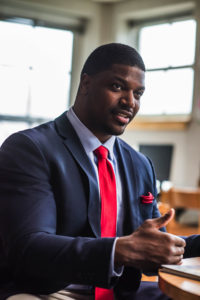
A couple of weeks ago, I was at a local activist’s house, a progressive activist. I consider myself progressive or liberal as well. But, when I was at their home having a conversation with them, they were so far left, it dawned on me that that voice is missing in mainstream media. You don’t even recognize it because you’re almost indoctrinated to think that CNN and MSNBC represent the Far Left, when they don’t. It had been so long since I spoke with an activist, that I was like, “Wow, you like reminded me what, you know… You reminded me of what, you know, certain beliefs, and some root ideas about the way the world should be really are.” Because you can get caught up in… I don’t know, I would say the noise of opinion based news that is really not what it proclaims or presents itself to be.
If it’s really about solution oriented thinking, is the spectrum really conservative and liberal, or is it really justice to non-justice? Is it about remediating problems that government created through opinion based legislation, or is it about what you just believe, and what you think, and what I think, and what I believe. Can we really pawn the truth off to what we believe and think? I’ve got news for you. Most of the political decisions don’t even touch you in a positive way. It doesn’t matter where you stand on the spectrum. I think it’s inherently flawed.
It has to go back to, in America, do we believe government has a role in solving problems? I would argue yes. I’m a political science major. I’m a student and a product of politics, or I’d say the tutelage of politics. I also believe that is one of the essential functions of government, right? Even if it goes back to the Constitution, and you see that the framers said in order to secure liberty and justice to ourselves, and our posterity, and to promote the general welfare… Preamble of the Constitution, right?
So, ultimately, there were some identified problems, and then institute a government to do X, which those were the challenges of that particular time. Because of an abuse of government, we produced a lot of problems in this country and all over the world. I think we need to, not abandon it, like some people would say, but again, rethink, repurpose, and retool, from the municipal to the state to the federal.
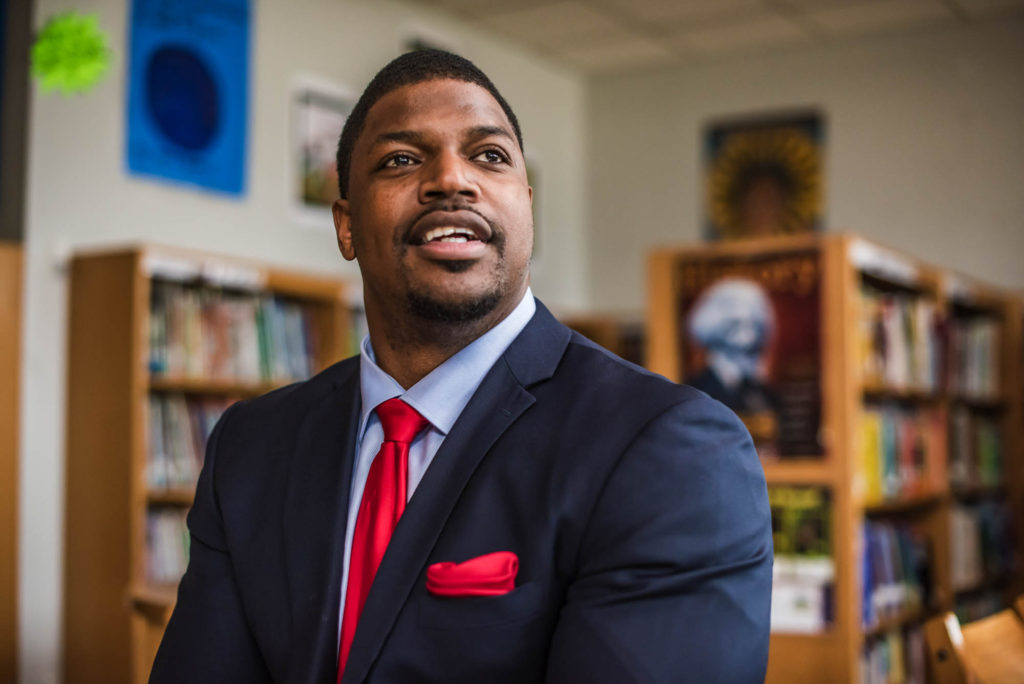
That’s why being in this school is so important to me because I think the provision of public education is an essential right in this country. Everyone deserves access to a high quality one. And I want to always keep children, the future, and the inherent I guess you could say moral orientation of the country at the forefront, of anything I do.
Remember this though, leaders are only sparks. Leaders are supposed to ignite the kind of public thought, opinion, energy that produces collective change. No one individual can create mass systemic change. Looking back at the George Eastman, and Frederick Douglass, Susan B. Anthony, and others more currently in business. We point to them, and I think at times we give them as individuals too much credit. Standing next to them were many individuals, lifting them up, and supporting them. If we’re waiting for a single person to save us, there will be more of the same.
